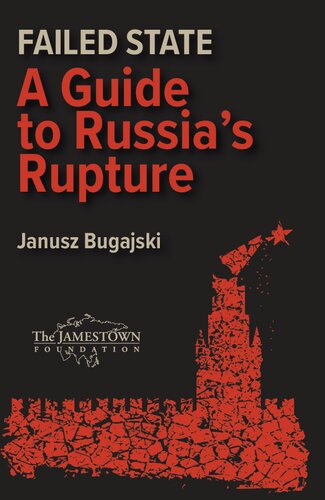Product desciption
Failed State Guide To Russias Rupture Janusz Bugajski by Janusz Bugajski 9781735275222, 9782022024400, 2022024400, 1735275220 instant download after payment.
"The Russian Federation is a failed state. It was constructed as the successor of the defunct Soviet Union but confronts crippling challenges to its own survival. During the last three decades, attempts to transform Russia into a nation-state, a civic state, or a stable imperial state have proved futile. The federation is based on brittle historical foundations and is unable to generate a unified national identity that would encompass its entire population. Instead, there is a persistent struggle over Russia's future between nationalists, imperialists, centralists, liberals, and federalists, with growing confrontations between Moscow and the country's diverse regions and ethnic republics. Russia's state failure is exacerbated by a hazardous confluence of factors, including an inability to ensure economic growth, stark socio-economic inequalities, formidable demographic defects, widening disparities between Moscow and the federal subjects, a precarious political pyramid based on personalism and clientelism, deepening distrust of government institutions and policies, increasing public alienation from a corrupt ruling elite, and growing disbelief in state propaganda. More extensive repression to stifle opposition and maintain state integrity in deteriorating economic conditions will raise the prospects for a violent rupture. Paradoxically, while the assumption of power by Vladimir Putin was based on a pledge of preventing Russia's disintegration, he may ultimately be remembered as a failed leader who presided over the country's demise. New territorial entities and proto states will surface as Moscow's credibility crisis deepens amidst spreading ungovernability, elite power struggles, political polarization, nationalist radicalism, and regional and ethnic revivals. The aspiring states that emerge from Russia will not be uniform in their internal political and administrative structures. Border conflicts and territorial claims will be visible between some entities, while others may develop into new federal or confederal states. Escalating turmoil and state rupture in Russia will impact neighboring countries. Some will be susceptible to spillovers of conflict or subject to Moscow's provocations, as the Kremlin will seek to divert attention from domestic upheaval. Other states will benefit from Russia's cleavages by easing their security concerns, expanding their regional influence, and regaining lost territories. The US must develop an effective strategy for managing Russia's rupture by supporting regionalism and federalism, acknowledging the self-determination of nascent states, calibrating the position of other major powers, developing linkages with emerging countries, strengthening the security of Russia's neighbors, and promoting trans-Atlanticism among all burgeoning states"--


